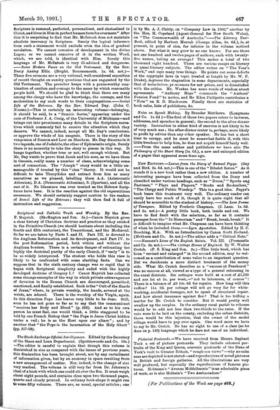New EDITIONS. — Leaves from the Diary of Samuel Pep ye. (Gay
and Bird. 2s. 6d. net.)—This is one of the "Bibelot Series." As it stands it is a new book rather than a new edition. A number of interesting passages have been collected from the Diary and classified under various headings, such as "Dress," "Sports and Pastimes," "Plays and Players," "Books and Booksellers," "The Clergy and Public Worship." This is a good idea: Pepys's book bears this treatment very well. The ordinary reader can easily have too much of it, though it is quite right that all should be accessible to the student of history. —The Love Poems of Tennyson. Edited by Frederic Chapman. (J. Lane. le. 6d. and 2s. net.)— A pretty little book, both inside and out. We have to find fault with the selection, so far as it contains passages from the" In Memoriam" and" Break, break, break." It is difficult to imagine what Mr. Chapman can have been thinking of when he included them.—Lyra Apostolica. Edited by H. C. Beeching, M.A. With an Introduction by Canon Scott Holland. (Methuen and Co. 2s. net.)—The editor adds a " Critical Note." —Newman's Lives of the English Saints. VoL III. (Fremantle and Co. 6s. net.)—The Cottage Homes of England. By W. Walter Crotch. P. S. King and Son. 2s.)—This little book, which has been "revised and enlarged" in the second edition, may be wel- comed as a contribution of some value to an important question. But we desiderata a more distinct treatment of the money side. What Mr. Crotch describes as a "success at Penshurst was no success at all, viewed as a type of a general rehousing in the rural districts. Six cottages were built at a cost of .21,539 and are let at 5s. per week,—" not to labourers, of course" ! There is a balance of .£3 10s. 6d for repairs. How long will this suffice ? us. 9d. per cottage will not go very far for white- washing, accidental damages, not to speak of structural repair. And how about insurance against fire ? That is too trifling a matter for Mr. Crotch to consider. But it would pretty well swallow up the surplus. In the ordinary rural parish to rehouse would be to add not less than two-thirds to the rates. If the rate were to be laid on the county, excluding the urban districts, there would be this injustice, that the owner of the model village would have to pay over again. One word more we have to say to Mr. Crotch. He has no right to use of a class (as he does on p. 129) language which he dare not use of an individual.






































 Previous page
Previous page